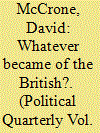|
|
|
Sort Order |
|
|
|
Items / Page
|
|
|
|
|
|
|
| Srl | Item |
| 1 |
ID:
071643


|
|
|
|
|
| Publication |
2006.
|
| Summary/Abstract |
The relationship between national identity and how people perceive and consume media is a central but largely untested assumption of studies of nationalism. Using a previously developed classification of identity among English migrants to Scotland, this paper explores associations between how people use the media and how they make sense of their national identity. Compared with Scottish nationals, who tend to adopt a more taken-for-granted and uncontentious view of the media, except when they feel that the media presented to them challenge their sense of identity, English migrants find that the agendas of the media in Scotland differ from those they are used to south of the border. Specifically, how they view the media tends to vary according to whether they view themselves as 'English', 'British' or as 'becoming Scottish'.
|
|
|
|
|
|
|
|
|
|
|
|
|
|
|
|
| 2 |
ID:
001631


|
|
|
|
|
| Publication |
London, Routledge, 1998.
|
| Description |
xx, 207p.
|
| Standard Number |
0415114594
|
|
|
|
|
|
|
|
|
|
|
|
Copies: C:1/I:0,R:0,Q:0
Circulation
| Accession# | Call# | Current Location | Status | Policy | Location |
| 041201 | 320.54/MCC 041201 | Main | On Shelf | General | |
|
|
|
|
| 3 |
ID:
129960


|
|
|
|
|
| Publication |
2014.
|
| Summary/Abstract |
Scholars know far less about 'national identity' than 'nations' and 'nationalism'. The authors argue that the concept is sociologically important and briefly discuss its relationship with language. They examine empirically how people living in the Gàidhealtachd, the area of Scotland associated with Gaelic language and culture, whether they are Gaelic speakers or not, whether incomers or not, go about their territorial identity business. The article shows how respondents' Gaelic identity relates to their British and Scottish identity; how people living in the Gàidhealtachd assess putative claims to a Gaelic identity based variously on language, residence and ancestry; and how they see the balance between 'cultural' and 'political' elements in Gaelic. The authors argue that to study 'what makes a Gael?' highlights the key role territorial identity plays in connecting social structure to social action, and also that identity provides a set of meanings and understandings through which people experience social structure and feel empowered to act.
|
|
|
|
|
|
|
|
|
|
|
|
|
|
|
|
| 4 |
ID:
127003


|
|
|
|
|
| Publication |
2013.
|
| Summary/Abstract |
Much of the debate about 'being British' is driven by the politics of the constitutional future of the United Kingdom. This has led to assertions about the declining impact of Britishness, and how, in the interests of the Union, it might be revived. Data from British and Scottish Social Attitudes surveys show that 'Britain' remains an important and meaningful frame of reference, even though people in England and Scotland may not define their prime national identity as British. The relationship between national identity and constitutional preferences is complex. Being 'strongly Scottish' is a weak predictor of constitutional preferences because almost all Scots are at the 'strong' end of the Scottish scale, whereas saying you are 'British' (or not) is a better guide. It is not a matter of choosing to be Scottish or English over being British, but recognising the complexity and inter-relationships of diverse territorial identities.
|
|
|
|
|
|
|
|
|
|
|
|
|
|
|
|
| 5 |
ID:
168755


|
|
|
|
|
| Summary/Abstract |
In the Brexit referendum in 2016, Scotland voted 62 per cent Remain, and England 53 per cent Leave. This article explores whether this came about because more people in Scotland considered themselves ‘strongly European’ compared with people in England. Analysis of Scottish and British Social Attitudes survey data for 2017 shows that people in Scotland are significantly more inclined to say they are ‘strongly European’ (45 per cent) than in England (34 per cent), a finding that holds true across the spectrum of socio‐demographic and political variables. Nevertheless, the key predictors of being strongly European are similar in both countries: having liberal values, high levels of education, political party support, as well as being British, while in Scotland supporting the Scottish National Party and being in favour of independence are important. ‘Being European’ has taken on different meanings in Scotland and England as the aftermath of the Brexit referendum works its way through the political process.
|
|
|
|
|
|
|
|
|
|
|
|
|
|
|
|
|
|
|
|
|